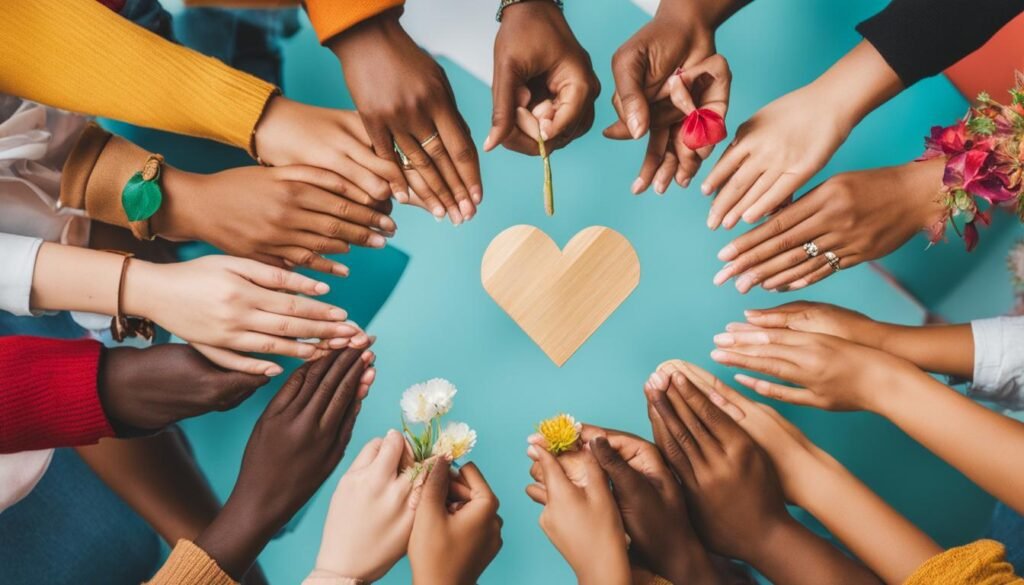Love languages are the unique ways individuals express their love and affection in relationships. Typically, these are associated with romantic relationships, but love languages can also manifest in platonic friendships. By understanding how people express and receive love platonically, we can strengthen our bonds and create deeper connections.
In this section, we will explore the concept of platonic love language, discussing the different ways people express love in platonic relationships. By embracing and understanding these unique gestures, we can create fulfilling friendships that nurture and support us.
Key Takeaways
- Love languages are not limited to romantic relationships.
- Understanding and embracing platonic love languages can deepen and strengthen friendships.
- Platonic gestures of love include acts of service, quality time, words of affirmation, physical touch (within appropriate boundaries), and receiving gifts.
Can Love Language Be Platonic?
Love language is often associated with romantic relationships, but it can certainly exist in a platonic context as well. Non-romantic love language is a way of communicating affection and care for someone without the presence of a romantic relationship between them.
Expressing love platonically can involve various acts of kindness and affirmations of appreciation. It can come in the form of spending quality time with a friend or offering words of encouragement and validation. Hugging, holding hands, and other forms of physical touch can also be platonic expressions of love as long as they are mutually agreed upon and within appropriate boundaries.
Understanding the nuances of platonic love language is crucial for strengthening friendships. By identifying their friends’ love language, individuals can better show their appreciation and affection. It can also foster a closer connection with friends and create a supportive and fulfilling friendship.
“There are some people in life that make you laugh a little louder, smile a little bigger, and live just a little bit better.”
Platonic love language is not limited to just one love language. All five love languages: acts of service, quality time, words of affirmation, physical touch, and receiving gifts, can be expressed platonically. Knowing and understanding how each person expresses and receives love can help friends better communicate and connect with each other.

Examples of Non-Romantic Love Language
| Love Language | Expression in a Platonic Context |
|---|---|
| Acts of Service | Helping a friend move or running errands for them to alleviate their stress. |
| Quality Time | Setting aside time to catch up and connect with a friend, whether it be through a phone call or a coffee date. |
| Words of Affirmation | Offering words of encouragement and validation to uplift a friend’s spirits. |
| Physical Touch | Hugging or holding hands with a friend as a comforting gesture. |
| Receiving Gifts | Giving a friend a thoughtful and meaningful gift as a gesture of appreciation and love. |
Platonic love languages help promote closer and more meaningful platonic relationships. By communicating love and appreciation to friends in ways that are tailored to their needs and preferences, individuals can strengthen their friendships to new levels of loyalty and support.
Love Languages Without Romance
In platonic relationships, showing love and affection can be just as important as in romantic relationships. Love languages are a great way to express love, appreciation, and care for your platonic friends. While love languages are often associated with romantic relationships, they can certainly be expressed without the element of romance. Here are some ways individuals can show love to their platonic friends:
| Love Language | Examples |
|---|---|
| Acts of Service | Helping a friend move, cooking them dinner, running errands for them |
| Quality Time | Going on a walk, having a movie night, sharing a meal together |
| Words of Affirmation | Giving compliments, expressing gratitude, offering words of encouragement |
| Physical Touch | Hugging, holding hands, giving a high five or pat on the back (within appropriate boundaries) |
| Receiving Gifts | Bringing them their favorite coffee, buying them a small souvenir, making a meaningful craft or card for them |
Remember, everyone has different preferences when it comes to receiving love languages. It’s important to understand what makes your platonic friend feel loved and appreciated. Communicate openly and honestly with each other, and try to incorporate their preferred love languages into your interactions. By doing so, you can strengthen your bond and create a supportive and fulfilling friendship.

Conclusion
In conclusion, love languages are not limited to romantic relationships and can be present and meaningful in platonic friendships. Understanding and embracing the unique ways people express and receive love in platonic relationships can strengthen our bonds and create deeper connections without the need for romance.
Platonic love language allows us to show our affection and care for friends in ways that are meaningful to them, fostering a supportive and fulfilling friendship. Whether it’s acts of service, quality time, words of affirmation, physical touch (within appropriate boundaries), or receiving gifts, expressing love in any of these ways can strengthen our platonic relationships and enhance our overall well-being.
FAQ
Can love language be platonic?
Yes, love language can exist in platonic relationships. Love languages are not exclusive to romantic partnerships and can be expressed and understood platonically.
How do love languages manifest in platonic friendships?
Love languages in platonic friendships can be expressed through acts of service, quality time, words of affirmation, physical touch (within appropriate boundaries), and giving thoughtful gifts. Each person may have different preferences for how they receive love.
How can I understand and communicate love languages in a platonic relationship?
Understanding and communicating love languages in a platonic relationship requires open and honest communication. Take the time to learn about your friend’s preferences and actively make an effort to express love in the ways that are meaningful to them.
Can platonic gestures of love be misunderstood as romantic interest?
While it is possible for platonic gestures of love to be misinterpreted, clear communication and boundaries can help avoid misunderstandings. It is important to have open conversations about intentions and ensure that both parties are on the same page.
Are there any boundaries to consider when expressing love language in platonic relationships?
Yes, it is important to respect personal boundaries and ensure that physical touch and other displays of affection are appropriate and consensual. Everyone has their own comfort levels, so it is essential to communicate and obtain consent before engaging in any physical displays of love.
How can love languages strengthen platonic friendships?
Understanding and expressing each other’s love languages can deepen the bond in a platonic friendship. It shows care, thoughtfulness, and appreciation, which fosters a stronger connection and a more fulfilling relationship.
Can love languages evolve in a platonic relationship?
Yes, love languages can evolve in platonic relationships over time. As individuals change and grow, their preferences for how they receive love may also change. It is important to regularly check in and adapt to these changes to ensure that both individuals feel valued and loved.

